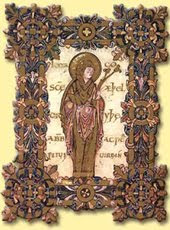 Abbess of Ely (679)
Abbess of Ely (679)
Queen of Northumbria; born (probably) about 630; died at Ely, 23 June, 679. While still very young she was given in marriage by her father, Anna, King of East Anglia, to a certain Tonbert, a subordinate prince, from whom she received as morning gift a tract of land locally known as the Isle of Ely.
St. Wilfrid was her friend and spiritual guide, but it was to him that Egfrid, on succeeding his father, appealed for the enforcement of his marital rights as against Etheldreda’s religious vocation. The bishop succeeded at first in persuading Egfrid to consent that Etheldreda should live for some time in peace as a sister of the Coldingham nunnery, founded by her aunt, St. Ebba, in what is now Berwickshire. But at last the imminent danger of being forcibly carried off by the king drove her to wander southwards, with only two women in attendance. They made their way to Etheldreda’s own estate of Ely, not, tradition said, without the interposition of miracles, and, on a spot hemmed in by morasses and the waters of the Ouse, the foundation of Ely Minster was begun. This region was Etheldreda’s native home, and her royal East Anglian relatives gave her the material means necessary for the execution of her holy design.
St. Wilfrid had not yet returned from Rome, where he had obtained extraordinary privileges for her foundation from Benedict II, when she died of a plague which she herself, it is said, had circumstantially foretold. Her body was, throughout many succeeding centuries, an object of devout veneration in the church which grew up on her foundation. One hand of the saint is now venerated in the church of St. Etheldreda, Ely Place, London.
From here
